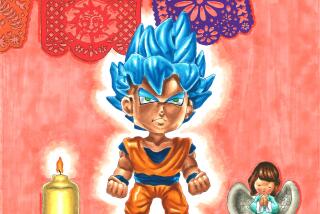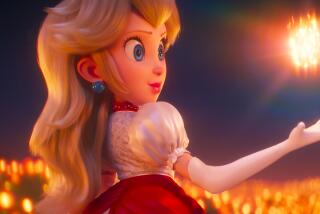A fuzzier logic makes its way into the funnies
- Share via
Manga, the Japanese cartoon art that gives “wide-eyed innocence” new meaning, has finally made its way to some 30 U.S. daily newspapers -- including this one -- with “Peach Fuzz,” the tale of a girl and her ferret.
Written and drawn by Americans Jared Hodges and Lindsay Cibos, the strip -- the first manga to appear in mainstream comics pages here -- is published by L.A.-based TOKYOPOP, the leading publisher of manga in the U.S., and distributed by Universal Press Syndicate. The strip begins today in The Times and runs for 20 weeks, followed by another manga, “Van Von Hunter.”
In case you’ve snoozed through the manga explosion, a bit of background: Manga (Japanese for “comic” and pronounced with a hard G as in “gang”) is story-driven, crossing a range of genres from romance to horror.
It has been a staple of Japanese culture for decades and has created disciples worldwide, including many in the fine arts community.
Says Stuart Levy, CEO and chief creative officer of TOKYOPOP, “Manga had grown and matured in Japan into various genres. In our mentality, we compare it to film.”
“Peach Fuzz” began as a short story, winning first prize in a TOKYOPOP competition. It tells of the cautious love between 9-year-old Amanda Keller and Peach, the ferret. Each has a rich fantasy life: For instance, Amanda’s fingers appear as dragons to Peach.
“American strips concentrate on comedy, while American comic [books] are concerned with superheroes,” says Levy. “Manga is carrying the torch for diversity.”
Despite that diversity, though, there’s a preponderance of characters that look like hyperthyroid children with the new Michael Jackson nose.
Appealing equally to both sexes, manga accounts for 75% of all graphic novel sales in the United States and 40% of total publishing sales in Japan. With that kind of success, one would expect newspapers to have jumped on the bandwagon earlier, but Levy says it took two years to develop the “Peach Fuzz” project.
That was no deterrent. “We’re trying to create a global revolution here.”
-- CASEY DOLAN
More to Read
The biggest entertainment stories
Get our big stories about Hollywood, film, television, music, arts, culture and more right in your inbox as soon as they publish.
You may occasionally receive promotional content from the Los Angeles Times.










